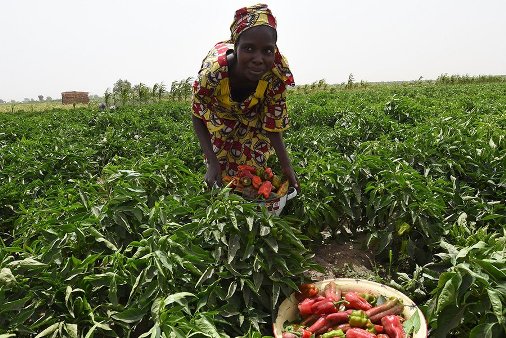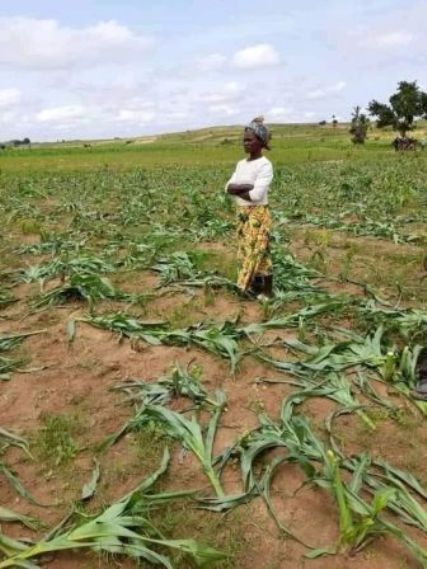No products in the cart.


From community development to food production, rural women are key contributors to national development. Their role traditionally is confined to domestic chores, caregiving, farming and other trades that are often considered petty trades. They lack access to education and are exposed to limited employment opportunities. Their contributions to the national economy and development are not always fully recognized.
Rural women constitute about one-fourth of the world’s population and they play key roles in the economic activities of the country.
The primary economic activities performed by rural women are trading, farming, food production and processing, sewing, and handcraft, creative art, rearing of livestock and bringing the farm produce to the convenience of the end users. They also engage in performing arts.
Their contribution in any community is very important as they are the backbone of the community from being a mother, a wife, a community leader, child caregiver and trading to take care of the home and contribute to the development of the nation.
As rural women are key contributors to economic growth and are at the forefront of food production, they are affected by several challenges that impede their capacity to produce. They are faced with limited access to credit facilities, health care, education, insecurity, inflation, land rights and environmental factors among others.
A good percentage of food consumed in the nation is produced by the rural women. Food insecurity and sustainability is one of the major issues that affect the nation today.
In his Independence Day address to the nation, President Buhari noted that the middlemen are the prime reason for the high cost of food and the impending food crisis. Insecurity is also a very prime reason that rural women can no longer go to farms and thereby are subjected to loss of income.
As the nation is bedeviled with security challenges, the rural women are mostly hit, and because of illiteracy, and their output is controlled by the middlemen who make most out of the efforts of these women.
They are mostly exposed to hazards with little or no attention by the government through policy recognition and laws that would cater to their security and well-being.
Challenges facing rural women
The rural women contribute to the general economic sustainability of the country; they are in turn contributing to the national development. These efforts by the rural women who play key roles in the provision of food are also not without many challenges.
Lack of processing and storage facility: Most of the foods produced by the rural women often spoil and waste due to lack of processing and storage facility. As some of these produce are seasonal, the women use other non-guaranteed means to store their produce. The waste affects the women and the nation’s food sustainability.
Insecurity: As the country is grappling with insecurity, the rural women bear much of the burden. Being vulnerable, they are killed, raped, and they suffer brutality in the hands of gunmen and bandits and get injured in their communities and on their farms. A lot of them have their farms pillaged by the bandits and herdsmen and this affects food production.

A woman stands in a destroyed maize farm. Photo: Google
Lack of social amenities: Lack of good roads, health care facilities, educational facilities, electricity, good drinking water are challenges facing the rural women. Bad roads impact the conveyance of their farm produce to the market, as their health fails, they have little to no access to health care even as they have limited funds to pay for quality healthcare. Government, recognizing the contributions of rural women towards the development of the country, they deserve these amenities which will enhance their life and improve their production.
Lack of credit facilities: Credit facilities help the women to be able to expand their trade and farming which in turn expands food production. Many rural women operate in a very manual and limited funding that reduces the amount of food they can produce.
Lack of personal development: Rural women are mostly challenged by their lack of education. Developing themselves to meet up with new ways of engaging in community and economic activities are often lost. The lack makes them not to have adequate knowledge, even, their legal rights.
Lack of land rights: Rural women are affected by cultural and traditional restrictions which often favour the men. In many cultures, women have no rights to land. Having no access to land, affects the level of their output or involvement in economic activities.
Ways to empower the rural women
For rural women to be empowered, education and mentoring are very important to them. This can be achieved through engaging them in training and adult education which will take care of their personal, emotional and social development. Education is the key to an empowered woman who can be confident to defend her rights.
Rural women can be taken through business and vocational training. As the women mostly engage in farming and trading, the training will expose them to local and international business opportunities and market trends that will bypass the exploitation of the middlemen. They will have access to the supply chain and market and as well monetary value for their farm produce and their crafts.
Having access to credit facilities will help the women in many ways. If women can access interest-free loans; modern agricultural mechanisation, and storage facilities built for them, their input to national food security will increase.
Raise awareness for governments to recognise the contribution of the rural women and enact policies that will positively affect them and improve their well-being. Providing and revamping social amenities like health care centres, and the rehabilitation of the bad roads will go a long way.
Ensuring the protection and safety of the women on their farms and in the markets is very important to ensure food sustainability.
Ensuring that the existing policies, while seeking for new policies of the Federal Ministry of Women Affairs and other state’s initiatives are operational and implemented and can be easily accessed by the rural women without many bottlenecks.
Rural women are important contributors to national development and as such, it is important that their contributions are recognized. They should be involved in policy decision-making processes at all levels of governments and community decision tables as that will ensure that their needs are met and new laws and policies are enacted and existing ones are implemented.
Please, share…